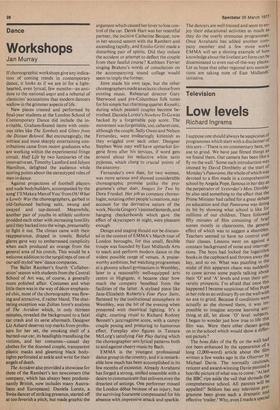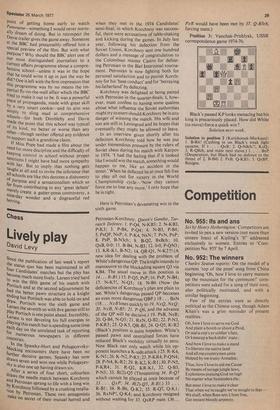Television
Low levels
Richard Ingrams
I suppose one should always be suspicious of programmes which start with a disclaimer of this sort---`There is no commentary here, no axe to grind. We have just filmed things as we found them. Our camera has been like a fly on the wall.' Some such introduction was intoned by David Dimbleby at the start of Monday's Panorama, the whole of which was devoted to a film made in a comprehensive school by Angela Pope, famous in her day as the perpetrator of Yesterday's Men. Dimbleby also said something to the effect that the Prime Minister had called for a great debate on education and that Panorama was doing its bit by showing what school is like for millions of our children. There followed fifty• minutes of film consisting of brief scenes mostly in classrooms, the general effect of which was to suggest a shambles. Teachers seemed to have no control over their classes. Lessons went on against a constant background of noise and interruptions. The boys had locked the logarithm books in the cupboard and thrown away the key, and so on. What was puzzling in the midst of this apparent chaos was suddenlY to come across some pupils talking about their '0' and 'A' levels and even their urnversity prospects. I'm afraid that once this happened I became suspicious of Miss POPe in her role as an ordinary fly on the wall with no axe to grind. Because if conditions were actually as she showed them, it was un" possible to imagine anyone learning anYthing at all, let alone '0' level subjects.. I began to wonder just how true to life tins film was. Were there other classes going on in the school which would show a different picture? The bona fides of the fly on the wall had not been enhanced by the appearance of a long (2,000-word) article about the all written a few weeks ago in the Observer bY Michael Davie. The normally cautious, reticent and award-winning Davie painted a horrific picture of what was to come: 'At last the BBC rips aside the veil that shrouds the comprehensive school. All parents will be appalled!' Seldom has any television Pr°: gramme been given such a dramatic and effective 'trailer.' Why, even! made asp ecial Point of getting home early to watch Panorama—something 1 would never normallY dream of doing. But in retrospect the Davie trailer gives the game away. Someone at the BBC had presumably offered him a special preview of the film. But with what Purpose? Why should the BBC alert one of our most distinguished journalists to a current affairs programme about a comprehensive school—unless it was in the hope that he could write it up in just the way he did ?One is left with the firm impression that this programme was by no means the impartial fiy-on-the-wall affair which the BBC tried to make it out to be. It was a powerful Piece of propaganda, made with great skill by a very smart cookie—and its aim was simply to sling mud at comprehensive schools—for both Dimbleby and Davie made the point that this school was typical of its kind, no better or worse than any other—though neither offered any evidence to support such a grandiose claim. If Miss Pope had made a film about the need for more discipline and the difficulty of keeping control in school without proper sanctions I might have had more sympathy With her. But to imply that nothing gets taught at all and to invite the inference that all schools are like this denotes a dishonesty of Purpose and a sensationalism which so far from contributing to any 'great debate' merely create a gutter-press controversy, a rune-day wonder and a disgraceful red
herring. when they met in the 1974 Candidates' semi-final, in which Korchnoy was successful, there were accusations of table-shaking and kicking during the games. In July last year, following his defection from the Soviet Union, Korchnoy sent one hundred dollars and a message of congratulation to the Colombian master Castro for defeating Petrosian in the Biel Interzonal tournament. Petrosian is now fighting both for personal satisfaction and to punish Korchnoy for his 'base conduct' and for 'betraying his fatherland' by defecting.
Korchnoy was delighted at being paired with Petrosian in the quarter-finals. I, however, must confess to having some qualms about what influence the Soviet authorities might try to exert should Korchnoy be in any danger of winning the match. His wife and son are still in Leningrad and he hopes that eventually they might be allowed to leave.
In an interview given shortly after his defection Korchnoy told how he was put under tremendous pressure by the rulers of Soviet chess during his match with Karpov in 1974. 'I had the feeling that if it looked like I would win the match, something would happen to me, like an accident in the street.' When he defected he at once felt free to play all out for victory in the World Championship cycle—'Now they cannot force me to lose any more.' I only hope that he is right.
Here is Petrosian's devastating win in the sixth game.



































 Previous page
Previous page